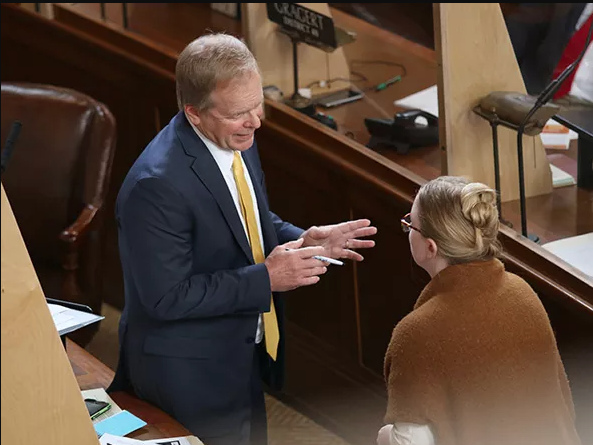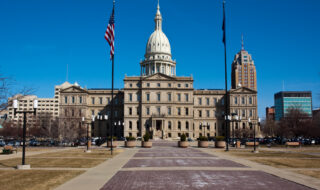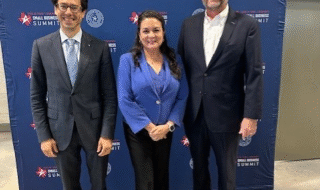May 14, 2021 Last Edit: June 5, 2025
NFIB Member Action Helps Derail Paid Leave Bill
State Director Bob Hallstrom reports from Lincoln on the small-business agenda for the legislative and political week ending May 14
The race to the finish line has begun in earnest as the Speaker of the Legislature announced on Thursday his intention to adjourn sine die on Thursday, May 27. Any controversial bills that may be subject to a potential gubernatorial veto will need to advance from Select File by the close of business next Tuesday to be passed in time to allow for motions on the final day of the session to override any gubernatorial vetoes.
Lawmakers spent the majority of the session on Wednesday debating a bill (Legislative Bill 474) to legalize medical cannabis. When the smoke had cleared, a motion to invoke cloture, which would end debate and force a vote on the bill and any pending amendments failed on a vote of 31-18, with 33 votes needed for adoption.
Paid Sick Leave Proposal Fails to Advance
Lawmakers debated and rejected a proposal on Monday evening that would allow employees to accrue a minimum of one hour of paid sick time for every 30 hours worked, with a minimum of 40 hours of paid sick time accrued in a calendar year.
Under the measure, employees would be entitled to use accrued paid sick time beginning on the 60th calendar day following commencement of employment. Paid sick leave would be authorized for:
- an employee’s mental or physical illness, injury, or health condition
- an employee’s need for medical diagnosis, care, or treatment of a mental or physical illness, injury, or health condition
- an employee’s need for preventative medical care
- care of a family member with a mental or physical illness, injury, or health condition
- care of a family member who needs medical diagnosis, care, or treatment of a mental or physical illness, injury, or health condition
- care of a family member who needs preventative medical care
- absence necessary due to domestic abuse, domestic assault, sexual assault, or stalking.
(NFIB Position – Opposed)
During General File debate, two amendments proposed by Sen. Tony Vargas (Omaha), sponsor of the bill, were defeated. The first amendment would have provided for application of the bill to employers with 50 or more employees (provisions of the original bill applied to four or more employees). The amendment failed on a 19-16 vote, with 25 votes needed for adoption. The second amendment offered by Senator Vargas would have changed the leave time from paid to unpaid and was also rejected by lawmakers on an 18-14 vote. Legislative Bill 258 failed to advance from General File on the following 17-20 vote:
Yes: Senators Blood, Bostar, Cavanaugh, J., Cavanaugh, M., DeBoer, Hansen, M., Hunt, Lathrop, McCollister, McDonnell, McKinney, Morfeld, Pansing Brooks, Vargas, Walz, Wayne, and Wishart.
No: Senators Albrecht, Arch, Brandt, Brewer, Clements, Dorn, Erdman, Flood, Geist, Gragert, Hansen, B., Hilgers, Hilkemann, Lindstrom, Lowe, Moser, Murman, Sanders, Slama, and Williams.
Excused – Not Voting: Senators Aguilar, Bostelman, Briese, Day, Friesen, Groene, Halloran, Hughes, Kolterman, Linehan, Pahls, and Stinner
Many thanks to the NFIB members who responded to an Action Alert to encourage their state senator to oppose LB 258.
Business Liability Protection Bill Surfaces
The long-awaited COVID-19 business liability protection legislation (Legislative Bill 139) was advanced to the floor of the Legislature by the Judiciary Committee and given first-round approval during the past week. Introduced by Sen. Tom Briese (Albion), LB 139 would provide a “safe harbor” from potential lawsuits alleging that a protected individual or organization negligently exposed an individual to COVID-19 infection. Under the bill, civil lawsuits would be prohibited as long as the protected individual or organization was acting in compliance with “federal public health guidance” (written or oral guidance related to COVID-19 issued by the Centers for Disease Control; the Centers for Medicare and Medicaid services; or the federal Occupational Safety and Health Administration). The bill does not affect the rights or limits under the Nebraska Workers’ Compensation Act.
The “safe harbor” protections in the bill as originally introduced were narrowed by the adoption of a Judiciary Committee amendment which removed provisions that would have prevented civil lawsuits unless an individual a) was diagnosed with a case of COVID-19 requiring in-patient hospitalization or resulting in death; and b) could prove, by clear and convincing evidence, that the condition occurred through gross negligence or willful misconduct.
Tax and Spending Bill Closer to Passage
The following series of tax relief and spending measures supported by NFIB were advanced to Final Reading during the past week.
- Legislative Bill 64 – Taxation of Social Security Benefits: Introduced by Sen. Brett Lindstrom (Omaha), and designated as a priority bill by Senator Mark Kolterman (Seward), as amended during Select File debate, LB 64 would provide, for tax years beginning on or after January 1, 2021, for a phase-in reduction of income taxation of Social Security benefits by 5%, increasing to 20% in 2022 and increasing by 10% each year thereafter until federal adjusted gross income is reduced by 50% of the benefits for tax years beginning on or after January 1, 2025. The bill was further amended to express legislative intent to continue incremental reduction of the tax on Social Security benefits to within the next five years to increase the percentage of Social Security benefits excluded by 10% each year until 100% of the benefits are excluded for tax years beginning on or after January 1, 2030. Reductions beyond 50% of the benefits to carry out the “legislative intent” will require affirmative legislative action in the future.
- Legislative Bill 388 – Nebraska Broadband Bridge Act: Introduced by Sen. Curt Friesen (Henderson) and designated as a priority bill by Speaker Mike Hilgers (Lincoln), LB 388 would appropriate $20 million annually, beginning with fiscal year 2021-22 to facilitate and fund the development of broadband networks in unserved and underserved areas. The bill would create grants to be used for development costs for a qualifying project and require matching funds from political subdivisions making application for a grant, equal to 50% of the total development costs.
- Legislative Bill 432 – Corporate Income Tax Parity: LB 432, as originally introduced, would have created parity between the highest marginal individual income tax rate of 6.84% in the top marginal corporate income tax rate by reducing the tax rate on corporate income in excess of $100,000 from 7.81% to 6.84% beginning January 1, 2022. During Select File debate, LB 432 was amended to phase in a smaller income tax rate cut for the next two years.
As amended, LB 432 would cut the state’s top corporate income tax rate to 7.5% for tax years beginning on or after January 1, 2022, with the rate falling to 7.25% for tax years beginning on or after January 1, 2023. The amendment further states the intent of the legislature to further reduce the rate to 7% for tax years beginning on or after January 1, 2024 and to 6.84% for all tax years thereafter. Subsequent reductions to carry out the “legislative intent” will require affirmative legislative action in the future.
Many thanks to the NFIB members who responded to an Action Alert to encourage their state senator to support LB 432.
Workers’ Compensation Bills Move On
The Legislature has given second-round approval to the following workers’ compensation bills:
- Legislative Bill 256 – Workers’ Compensation – Approval of Lump-Sum Settlement: LB 256, introduced by Sen. Matt Hansen (Lincoln), would clarify that a release of a lump-sum settlement for indemnity benefits only, that is not required to be submitted for approval by the Compensation Court, need not contain allegations regarding eligibility for Medicare if the employee’s right to receive future medical, surgical, and hospital services is specifically excluded from the settlement and Medicare has not paid medical, surgical, or hospital expenses or if Medicare has paid medical, surgical, or hospital expenses for which it claims it is entitled to reimbursement and Medicare has been reimbursed for such expenses at the time the settlement is executed. (NFIB Position-Support)
- Legislative Bill 407 – Workers’ Compensation – Mental Injuries/Mental Illness: Sen. Mike McDonnell (Omaha) has introduced legislation advanced to General File which would allow county correctional officers in a high population county (more than 300,000 inhabitants) to recover benefits for workplace mental injuries and mental illnesses unaccompanied by physical injury. (NFIB Position-Watch)
Previous Reports and Related Information
- April 2—Tax Reform/Relief Bills Advance
- February 26—A $20-an-hour Minimum Wage?
- February 12—NFIB Members Weigh in on Paid Leave Bill
- January 15—The Legislative Bill Mill Starts Turning

NFIB is a member-driven organization advocating on behalf of small and independent businesses nationwide.
Related Articles














